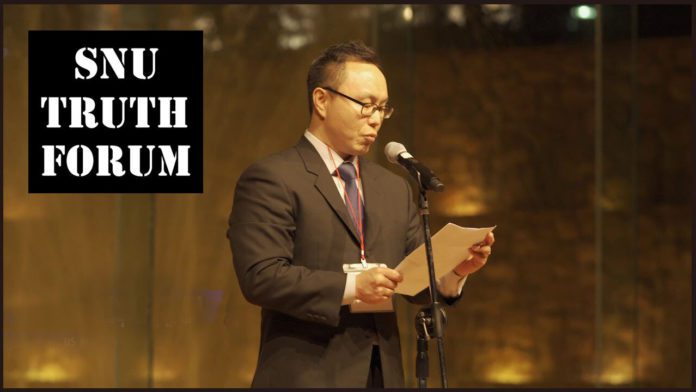A real challenge is that many people are still not aware of the danger that we are facing now. Some people choose to ignore the situation, as they enjoy the economic benefits from China. It could be an expression of a strong belief that free trade promotes peace, or it could be selfishness blinded by money. Perhaps, out of fear, it is an attempt to kick the ball down the road and avoid the issue as much as possible.
At its core, China has not changed. Last year, when the Hong Kong protests started, Truth Forum posted a large poster on the wall at Seoul National University (SNU) expressing concern about Xi Jinping’s policies that reinforce Sino-centrism and Maoism. The poster also urged the Xi government to take a prudent decision on Hong Kong to avoid unnecessary escalation towards war with the US. Since it was the first poster to speak about the Hong Kong protests, it drew much attention from Chinese students at SNU. The next day, a Chinese researcher named Zhao posted a response. Though it may not represent the view of all Chinese students, it revealed some of their dangerous underlying views. Below are some quotes of his response.
Maoism was and is the political ideology of the Chinese Communist Party (CCP). This has never changed. What has changed is the attitude towards it. In other words, China’s policies [with regard to] the US changed…The war between communism and capitalism has never stopped… To my dear Chinese fellows: we are part of the world. That means, we have both friends and enemies. Keep our friends close and enemies closer. Learn from them to grow stronger.
It is a fatal complacency of democracy if it carelessly in the name of tolerance and diversity, allows various forms of socialism, which imply hatred and violence. Maoism is the Chinese version of communism based on the directives of Mao. It is revolutionary socialism that has shed the blood of countless people throughout the history of the People’s Republic of China. The 1960s Cultural Revolution alone murdered tens of millions of people. However, Maoism is still embraced and finds sanctuary to grow and spread, taking advantage of an open democratic system.
In Europe, Maoism became another hope for many socialists who were disappointed with the Soviet Union’s version of communism. Frustrated with Stalin’s dictatorship, European socialists turned to Mao and praised his Cultural Revolution. Building a socialist state, like the Soviet Union, no longer seemed a tenable plan, as the world witnessed Stalin’s brutal dictatorship. At the same time, Mao’s claims to fundamentally reform the culture of society found avid support amongst European intellectuals, such as French philosopher Jean-Paul Sartre, who fervently praised Mao.
In Korea, most of the leaders of the democracy movement in the 1980s also commended Mao. It is now a well-known fact that they immersed themselves in Marxism and Jucheism, which is the North Korean version of communism, as they led the movement in the name of democracy. They thought highly of Mao who was fighting a nationalist struggle against western imperialism. In their view, South Korea was in the same position as China because it was going through class and national struggle at the same time. President Moon Jae-in himself and many of his people in the cabinet and the Blue House are from those activist groups.
Moon openly praises Rhee Young-hee, a deceased professor who stirred anti-US sentiments in South Korea, while fervently praising Mao and his Cultural Revolution. In his autobiography in 2011, Moon, applauding Rhee wrote, “I was thrilled to see the victory of truth” after reading Rhee’s article predicting US defeat in the Vietnam war. In 2017, Moon promised a 3 no’s policy to China: no more THAAD, no participation in the US missile defense system, and no ROK-US-Japan trilateral military alliance. In Moon’s official visit to China that year, in an address at Beijing University, he delivered a strong pro-China speech, describing China as a high mountain peak while referring to South Korea as a small country that would join the Chinese dream. In a similar vein, in his official visit to China in 2015, the Mayor of Seoul, Park Won-soon, expressed his support for Xi’s One Belt One Road project, assuring Seoul’s participation. He said, “A fly cannot go 10,000 li (Chinese mile) by itself. It can only do so when attached to the ass of a horse.” Some dismiss the remark as merely a quotation from a Chinese proverb. Yet, it is disgraceful for a person representing the capital city of South Korea to describe his own country as a fly.
As China opened its market, the world expected China to open its mind and become a friend of free society. However, the CCP is firmly based on Maoism and remains unchanged at its core. Free trade succeeded in maximizing mutual profits, but it has failed to install universal values in China. Failing to face this reality has grave consequences.
(continue)
David EunKoo Kim is the representative of the Truth Forum of Seoul National University, and absolutely committed to keeping the values of freedom, human-rights, and religions in the universities nationwide.
Mr. Kim majored in Law at Seoul National University, and currently pursuing his doctoral degree at the Law School of Seoul National University.
Truth Forum is the name of a group of conservative students in South Korea. Truth Forum has members from about 30 universities in Korea. Truth Alliance, a coalition group of Truth Forum at various universities, is led by David Kim who is the Representative of Truth Forum of Seoul National University.


